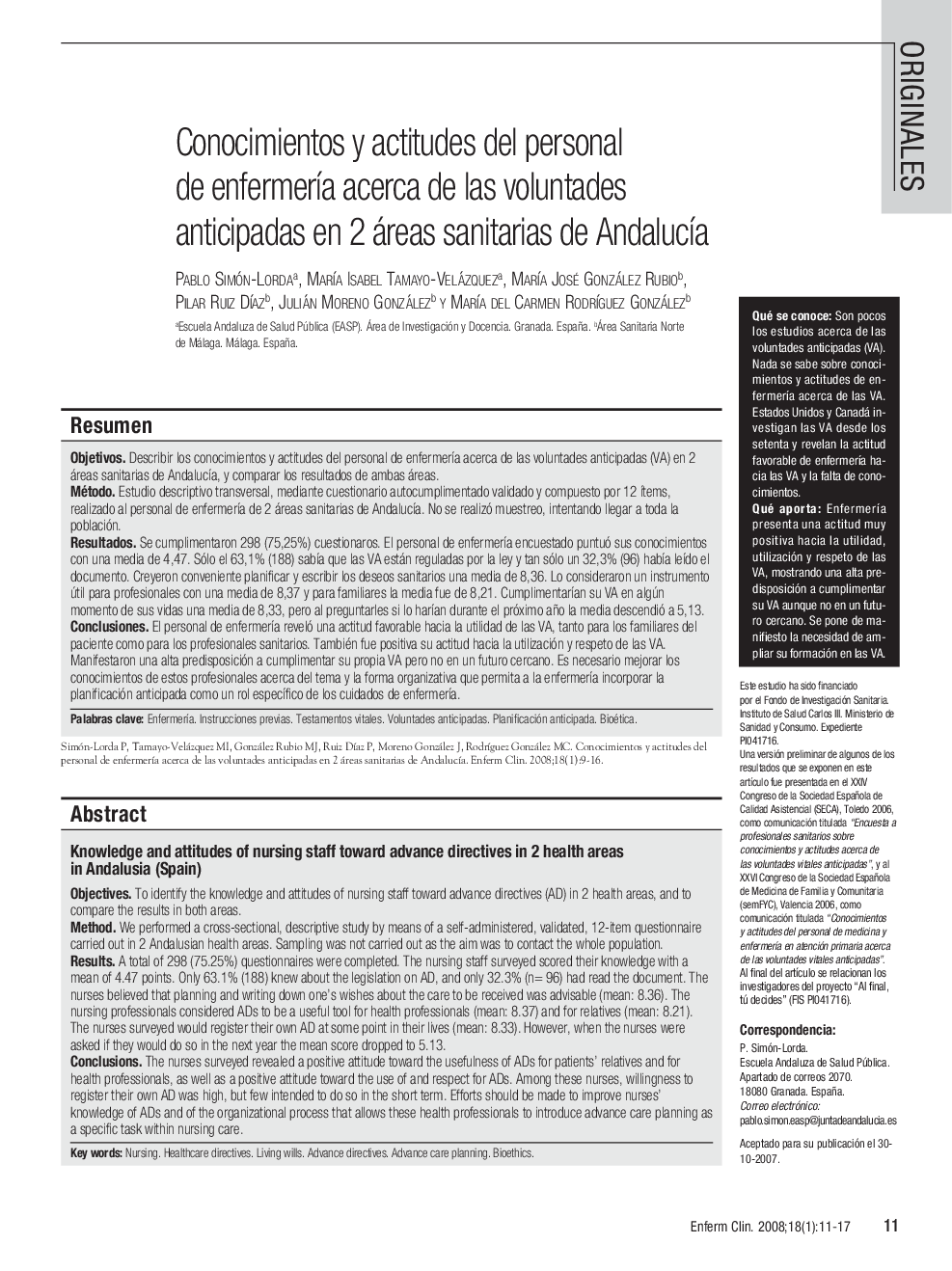| کد مقاله | کد نشریه | سال انتشار | مقاله انگلیسی | نسخه تمام متن |
|---|---|---|---|---|
| 2647549 | 1139050 | 2008 | 7 صفحه PDF | دانلود رایگان |

ResumenObjetivosDescribir los conocimientos y actitudes del personal de enfermería acerca de las voluntades anticipadas (VA) en 2 áreas sanitarias de Andalucía, y comparar los resultados de ambas áreas.MétodoEstudio descriptivo transversal, mediante cuestionario autocumplimentado validado y compuesto por 12 ítems, realizado al personal de enfermería de 2 áreas sanitarias de Andalucía. No se realizó muestreo, intentando llegar a toda la población.ResultadosSe cumplimentaron 298 (75,25%) cuestionaros. El personal de enfermería encuestado puntuó sus conocimientos con una media de 4,47. Sólo el 63,1% (188) sabía que las VA están reguladas por la ley y tan sólo un 32,3% (96) había leído el documento. Creyeron conveniente planificar y escribir los deseos sanitarios una media de 8,36. Lo consideraron un instrumento útil para profesionales con una media de 8,37 y para familiares la media fue de 8,21. Cumplimentarían su VA en algún momento de sus vidas una media de 8,33, pero al preguntarles si lo harían durante el próximo año la media descendió a 5,13.ConclusionesEl personal de enfermería reveló una actitud favorable hacia la utilidad de las VA, tanto para los familiares del paciente como para los profesionales sanitarios. También fue positiva su actitud hacia la utilización y respeto de las VA. Manifestaron una alta predisposición a cumplimentar su propia VA pero no en un futuro cercano. Es necesario mejorar los conocimientos de estos profesionales acerca del tema y la forma organizativa que permita a la enfermería incorporar la planificación anticipada como un rol específico de los cuidados de enfermería.
ObjectivesTo identify the knowledge and attitudes of nursing staff toward advance directives (AD) in 2 health areas, and to compare the results in both areas.MethodWe performed a cross-sectional, descriptive study by means of a self-administered, validated, 12-item questionnaire carried out in 2 Andalusian health areas. Sampling was not carried out as the aim was to contact the whole population.ResultsA total of 298 (75.25%) questionnaires were completed. The nursing staff surveyed scored their knowledge with a mean of 4.47 points. Only 63.1% (188) knew about the legislation on AD, and only 32.3% (n= 96) had read the document. The nurses believed that planning and writing down one's wishes about the care to be received was advisable (mean: 8.36). The nursing professionals considered ADs to be a useful tool for health professionals (mean: 8.37) and for relatives (mean: 8.21). The nurses surveyed would register their own AD at some point in their lives (mean: 8.33). However, when the nurses were asked if they would do so in the next year the mean score dropped to 5.13.ConclusionsThe nurses surveyed revealed a positive attitude toward the usefulness of ADs for patients' relatives and for health professionals, as well as a positive attitude toward the use of and respect for ADs. Among these nurses, willingness toregister their own AD was high, but few intended to do so in the short term. Efforts should be made to improve nurses' knowledge of ADs and of the organizational process that allows these health professionals to introduce advance care planning as a specific task within nursing care.
Journal: Enfermería Clínica - Volume 18, Issue 1, January 2008, Pages 11–17